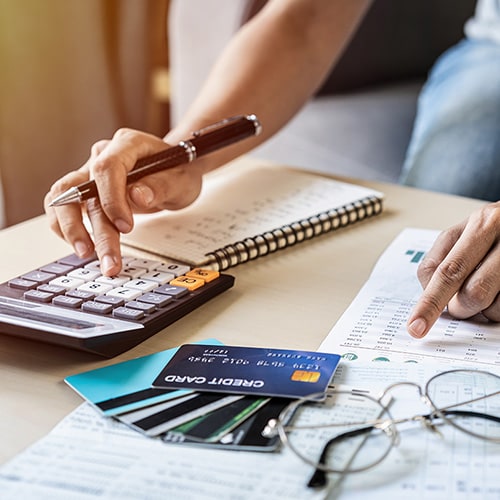In today's digital age, knowing how to protect your credit card online is more crucial than ever. With online fraud on the rise, taking proactive steps can save you from potential headaches. According to the TransUnion fraud report of 2024, online fraud cases have surged by 20%.
According to the FBI's Internet Crime Report, online credit card fraud resulted in losses of more than $4 billion last year. Protecting your credit card online is no longer optional; it’s a necessity.
Tips to help protect your credit card information:
- Stick with trusted, secure websites: When shopping online, always use websites that you trust and are secure. Look for URLs that begin with "HTTPS" rather than just "HTTP". The 'S' stands for secure, indicating that your data is encrypted, which makes it much harder for hackers to intercept your information.
- Sign up for 2-factor authentication and create strong passwords: Enhance your online security by enabling 2-factor authentication (2FA) on your accounts. This adds an extra layer of protection by requiring a second form of verification beyond just your password. Speaking of passwords, make sure they are strong, unique, and updated regularly.
- Avoid using public Wi-Fi: Public Wi-Fi networks can be a hacker's playground. Avoid making any financial transactions or accessing sensitive information when connected to public Wi-Fi. If necessary, use a VPN to secure your connection.
- Set up fraud alerts and notifications: Many banks and credit card companies offer fraud alert services. These alerts can notify you of any unusual or suspicious activity on your account, allowing you to respond quickly to potential threats.
- Review credit card statements and credit reports: Regularly review your credit card statements and credit reports to ensure there are no unauthorized transactions. Early detection is key to minimizing the impact of credit card fraud.
- Make routine updates: Ensure that your computer and mobile devices are always running the latest operating systems and software updates. These updates often include security patches that protect against new vulnerabilities.
- No one intentionally falls for scams Be wary of emails or messages asking for your personal information or credit card details. Phishing scams often masquerade as legitimate communications from trusted companies. Always verify the source before providing any information.
- Never save credit card info on a website: While it might be convenient to save your credit card information on frequently used websites, it also increases the risk of your data being compromised in a data breach. Enter your credit card information manually each time you make a purchase.
- Sign out after shopping: Always sign out of your accounts after completing your shopping. This simple step can prevent unauthorized access, especially on shared or public computers.
- Use identity theft protection service: Consider using identity theft protection service like LifeLock. These services offer comprehensive monitoring and alerts for suspicious activities, providing an additional layer of security for your personal and financial information.
- Report suspicious activities right away: If you notice any suspicious activities on your account, report them to your bank or credit card company immediately. Prompt action can help prevent further unauthorized transactions and minimize the damage.
Make online shopping secure and stress-free
Staying one step ahead of online credit card fraud is not just a smart move, it is essential. Implementing these proactive measures will significantly decrease your chances of falling victim to cybercriminals. Remember, while technology continues to evolve, so do the tactics of those looking to exploit your personal information. Do not just hope for the best—LifeLock can help.
FAQs about online credit card safety
What should I do if my credit card information gets stolen?
Immediately contact your credit card issuer to report the theft and request a freeze or cancellation of your card.
How can someone use my credit card without having it?
Fraudsters can use stolen credit card information for online purchases without needing the physical card. This is why securing your information online is crucial.
What are two safety tips that should be followed when using a credit card?
Always use secure websites and enable 2-factor authentication on your accounts for added security.
Editor’s note: Our articles provide educational information. LifeLock offerings may not cover or protect against every type of crime, fraud, or threat we write about.
Start your protection,
enroll in minutes.
LifeLock is part of Gen – a global company with a family of trusted brands.
Copyright © 2026 Gen Digital Inc. All rights reserved. Gen trademarks or registered trademarks are property of Gen Digital Inc. or its affiliates. Firefox is a trademark of Mozilla Foundation. Android, Google Chrome, Google Play and the Google Play logo are trademarks of Google, LLC. Mac, iPhone, iPad, Apple and the Apple logo are trademarks of Apple Inc., registered in the U.S. and other countries. App Store is a service mark of Apple Inc. Alexa and all related logos are trademarks of Amazon.com, Inc. or its affiliates. Microsoft and the Window logo are trademarks of Microsoft Corporation in the U.S. and other countries. The Android robot is reproduced or modified from work created and shared by Google and used according to terms described in the Creative Commons 3.0 Attribution License. Other names may be trademarks of their respective owners.





